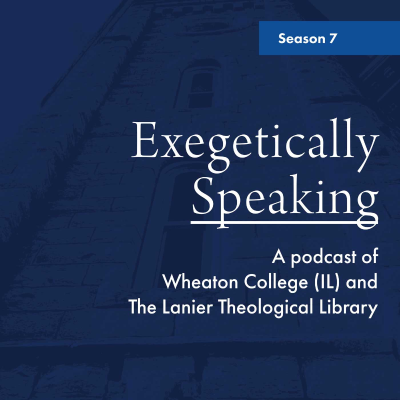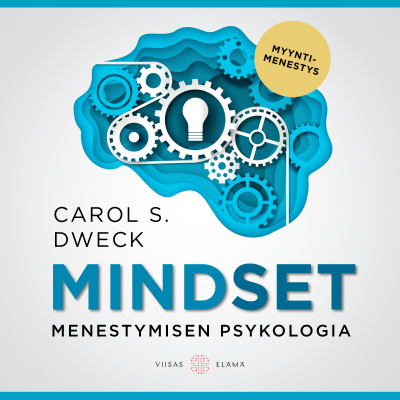
Exegetically Speaking
englanti
Historia & uskonnot
Rajoitettu tarjous
1 kuukausi hintaan 1 €
Sitten 7,99 € / kuukausiPeru milloin tahansa.
- Podimon podcastit
- Lataa offline-käyttöön
Lisää Exegetically Speaking
"Exegetically Speaking" is a weekly podcast of the friends and faculty of Wheaton College, IL and The Lanier Theological Library. Hosted by Dr. David Capes, it features language experts who discuss the importance of learning the biblical languages—Hebrew, Aramaic, and Greek—and show how reading the Bible in the original languages "pays off." Each podcast lasts between seven and eleven minutes and covers a different topic for those who want to read the Bible for all it is worth. Click on the ⓘ symbol below for each episode to read the description. If you're interested in going deeper, learn more about Wheaton's undergraduate degree in Classical Languages (Greek, Hebrew, and Latin) and our MA in Biblical Exegesis.
Kaikki jaksot
334 jaksotCreative Work and Sustaining Work, with Baruch Kvasnika: Genesis 2:1-3 and Exodus 20:8-11
What sort of work do the Scriptures forbid on the Sabbath? What sort of work is allowed? Attention to the Hebrew words used in connection with the Sabbath and in other contexts sheds some light on these questions. Dr. Baruch Kvasnika is President of Jerusalem Seminary [https://nam11.safelinks.protection.outlook.com/?url=https%3A%2F%2Fjerusalemseminary.org%2F&data=05%7C02%7Crebecca.a.larson%40wheaton.edu%7C43d4e8bbcd9847d0888d08de3bed33ee%7Cb7098c8ac6b24e8bba4c872cf5f00a20%7C0%7C0%7C639014087183097631%7CUnknown%7CTWFpbGZsb3d8eyJFbXB0eU1hcGkiOnRydWUsIlYiOiIwLjAuMDAwMCIsIlAiOiJXaW4zMiIsIkFOIjoiTWFpbCIsIldUIjoyfQ%3D%3D%7C0%7C%7C%7C&sdata=R9xzXvCIZbv%2FZsXyInQSR%2BrT1ciU8Z%2FY%2BHT3y%2Bi6jV4%3D&reserved=0], which equips believers to understand their faith in and through the land of the Bible. His dissertation at The Hebrew University of Jerusalem was, "The Language of Practice: Hebraic Walking and Way Metaphors in First Century Greek Related to Conduct."
Saying What is Unsaid, with Seth Ehorn: Philemon 19
Toward the close of his short letter to Philemon, Paul offers to pay any debt Onesimus may owe Philemon, and adds (ESV), "I, Paul, write this with my own hand: I will repay it—to say nothing of your owing me even your own self." The last words are often viewed as heavy-handed, but are better understood as an instance of paralipsis in which Paul "brings up something without bringing it up." He is employing a tactful approach to mention a delicate matter. Dr Seth Ehorn, an alum of the MA in Biblical Exegesis program at Wheaton Graduate School [https://www.wheaton.edu/graduate-school/degrees/ma-in-biblical-exegesis/], is Assistant Professor of Classics and Biblical Languages at Houston Christian University. Among other things, he has published 2 Maccabees 1-7: A Handbook on the Greek Text [https://nam11.safelinks.protection.outlook.com/?url=https%3A%2F%2Fwww.amazon.com%2FMaccabees-1-7-Handbook-Baylor-Septuagint%2Fdp%2F1481313827%2Fref%3Dsr_1_2%3Fdib%3DeyJ2IjoiMSJ9.uvazS_ISXSWVoUzqp_md73_-CaYIJkExSTcH1rMUCG3WyIcb13XUJPllZLtv9g62C0KQrIeg_qpAivpsiLQUL5YufGQWwYPGZBr4OvCynXlV6V2E_hbkSJPjG7o3BxbjfCcZLqoaXuG9R2GkoISJ3wQw7j31MN8V5Ik3zfjvzBM9KZGyzpumOblKfYC3gbJHw0jYWuJZWv74TqUdNPGvcEbDhlChaMGm6Cj7Y3TfRZo.SI8LzGr7wkfB4rVtuu-dopX4mRAVrjxnki1tcLrc98s%26dib_tag%3Dse%26qid%3D1735848243%26refinements%3Dp_27%253AEhorn%2BEhorn%26s%3Dbooks%26sr%3D1-2%26text%3DEhorn%2BEhorn&data=05%7C02%7Crebecca.a.larson%40wheaton.edu%7Cb7254d0f02234d6f1cc508de30ea5299%7Cb7098c8ac6b24e8bba4c872cf5f00a20%7C0%7C0%7C639001980123126813%7CUnknown%7CTWFpbGZsb3d8eyJFbXB0eU1hcGkiOnRydWUsIlYiOiIwLjAuMDAwMCIsIlAiOiJXaW4zMiIsIkFOIjoiTWFpbCIsIldUIjoyfQ%3D%3D%7C0%7C%7C%7C&sdata=Oh6YbxuAfzICrnqCbg6V0KNBAzwiRZS%2BL0%2F9DZOlI6U%3D&reserved=0] and 2 Maccabees 8-15: A Handbook on the Greek Text [https://nam11.safelinks.protection.outlook.com/?url=https%3A%2F%2Fwww.amazon.com%2FMaccabees-8-15-Handbook-Baylor-Septuagint%2Fdp%2F1481316028%2Fref%3Dsr_1_3%3Fdib%3DeyJ2IjoiMSJ9.uvazS_ISXSWVoUzqp_md73_-CaYIJkExSTcH1rMUCG3WyIcb13XUJPllZLtv9g62C0KQrIeg_qpAivpsiLQUL5YufGQWwYPGZBr4OvCynXlV6V2E_hbkSJPjG7o3BxbjfCcZLqoaXuG9R2GkoISJ3wQw7j31MN8V5Ik3zfjvzBM9KZGyzpumOblKfYC3gbJHw0jYWuJZWv74TqUdNPGvcEbDhlChaMGm6Cj7Y3TfRZo.SI8LzGr7wkfB4rVtuu-dopX4mRAVrjxnki1tcLrc98s%26dib_tag%3Dse%26qid%3D1735848387%26refinements%3Dp_27%253AEhorn%2BEhorn%26s%3Dbooks%26sr%3D1-3%26text%3DEhorn%2BEhorn&data=05%7C02%7Crebecca.a.larson%40wheaton.edu%7Cb7254d0f02234d6f1cc508de30ea5299%7Cb7098c8ac6b24e8bba4c872cf5f00a20%7C0%7C0%7C639001980123158287%7CUnknown%7CTWFpbGZsb3d8eyJFbXB0eU1hcGkiOnRydWUsIlYiOiIwLjAuMDAwMCIsIlAiOiJXaW4zMiIsIkFOIjoiTWFpbCIsIldUIjoyfQ%3D%3D%7C0%7C%7C%7C&sdata=Vtoxtk8p%2Bzh3wX6YM4i4%2FsuUsOjtASn4QGY5bwyPkaY%3D&reserved=0], both in the Baylor Handbook on the Septuagint Series. He is currently working on a commentary on Paul's Letter to Philemon. He has contributed several previous episodes to Exegetically Speaking.
Superordinated Duty and the Law, with Paul Sloan: 1 Corinthians 9:21
In an important line, Paul is frequently understood to be referring to at least two laws, the law of Moses, which the apostle is no longer "under," and a law of Christ, which he is still "under" (1 Cor. 9:21). Jewish parallels and the Greek words Paul uses suggest, however, that it is Paul's commission to preach the gospel that can override some Mosaic laws when they hinder his mission. Paul appears to be a transgressor of Moses' law but he insists he is conducting himself lawfully with respect to Moses because of Christ who commissioned him. Dr. Paul Sloan is Associate Professor of Early Christianity at Houston Christian University. He has published Jesus and the Law of Moses: The Gospels and the Restoration of Israel within First-Century Judaism [https://nam11.safelinks.protection.outlook.com/?url=https%3A%2F%2Fwww.amazon.com%2FJesus-Law-Moses-Restoration-First-Century%2Fdp%2F1540966380%2Fref%3Dtmm_pap_swatch_0&data=05%7C02%7Cjesse.doogan%40wheaton.edu%7C5135a964ea964800521308de2b6a2df1%7Cb7098c8ac6b24e8bba4c872cf5f00a20%7C0%7C0%7C638995932202117108%7CUnknown%7CTWFpbGZsb3d8eyJFbXB0eU1hcGkiOnRydWUsIlYiOiIwLjAuMDAwMCIsIlAiOiJXaW4zMiIsIkFOIjoiTWFpbCIsIldUIjoyfQ%3D%3D%7C0%7C%7C%7C&sdata=hSoDHAuTekMY1%2FFxcf0LeaTpg8YH1z52SdfXN6q3ByY%3D&reserved=0]. Check out related programs at Wheaton College: B.A. in Classical Languages (Greek, Latin, Hebrew): https://bit.ly/4raJmyq [https://bit.ly/4raJmyq] M.A. in Biblical Exegesis: https://bit.ly/4piXJQ9 [https://bit.ly/4piXJQ9]
Jesus, Son of God, with Christopher M. Hays: Mark 1:1 and 15:39
In the opening line of Mark's Gospel Jesus is referred to as "the Son of God," except that the Greek phrasing in this instance, somewhat non-typically, lacks any definite article. That this idiom echoes imperial propaganda is seen to be likely when a Roman centurion employs the same wording as he observes how Jesus died on their cross. Dr. Christopher Hays, a return contributor to this podcast, is president of Scholar Leaders [https://nam11.safelinks.protection.outlook.com/?url=https%3A%2F%2Fwww.scholarleaders.org%2F&data=05%7C02%7Cjesse.doogan%40wheaton.edu%7C6f7ee74b8c0d4472358b08de25c32bc0%7Cb7098c8ac6b24e8bba4c872cf5f00a20%7C0%7C0%7C638989717334387142%7CUnknown%7CTWFpbGZsb3d8eyJFbXB0eU1hcGkiOnRydWUsIlYiOiIwLjAuMDAwMCIsIlAiOiJXaW4zMiIsIkFOIjoiTWFpbCIsIldUIjoyfQ%3D%3D%7C0%7C%7C%7C&sdata=gKiAERN6DzTkYSnifKlWyTCZs7dSAO3P3mEWAk1AHwk%3D&reserved=0] and host of Faith on the Road Podcast [https://nam11.safelinks.protection.outlook.com/?url=https%3A%2F%2Fwww.scholarleaders.org%2Fstory%2Ffaith-on-the-road-podcast%2F&data=05%7C02%7Cjesse.doogan%40wheaton.edu%7C6f7ee74b8c0d4472358b08de25c32bc0%7Cb7098c8ac6b24e8bba4c872cf5f00a20%7C0%7C0%7C638989717334410993%7CUnknown%7CTWFpbGZsb3d8eyJFbXB0eU1hcGkiOnRydWUsIlYiOiIwLjAuMDAwMCIsIlAiOiJXaW4zMiIsIkFOIjoiTWFpbCIsIldUIjoyfQ%3D%3D%7C0%7C%7C%7C&sdata=4IRLPG7wG0SWesZAxxbf0qdCm4%2F%2Bm%2FpnA1BESwNU8JE%3D&reserved=0]. Among his publications are When the Son of Man Didn't Come: A Constructive Proposal on the Delay of the Parousia [https://nam11.safelinks.protection.outlook.com/?url=https%3A%2F%2Fwww.amazon.com%2FWhen-Son-Man-Didnt-Come%2Fdp%2F1451465548&data=05%7C02%7Cjesse.doogan%40wheaton.edu%7C6f7ee74b8c0d4472358b08de25c32bc0%7Cb7098c8ac6b24e8bba4c872cf5f00a20%7C0%7C0%7C638989717334434990%7CUnknown%7CTWFpbGZsb3d8eyJFbXB0eU1hcGkiOnRydWUsIlYiOiIwLjAuMDAwMCIsIlAiOiJXaW4zMiIsIkFOIjoiTWFpbCIsIldUIjoyfQ%3D%3D%7C0%7C%7C%7C&sdata=j%2F5lCzaqBrd79nOeDfDOrnpzlO3o2c0LxTsLfiZV6vw%3D&reserved=0] and Eight Million Exiles: Missional Action Research and the Crisis of Forced Migration [https://nam11.safelinks.protection.outlook.com/?url=https%3A%2F%2Fwww.amazon.com%2FEight-Million-Exiles-Missional-Migration%2Fdp%2F0802882390%2Fref%3Dsr_1_1%3Fcrid%3D2GZ6N1UMC1TR3%26dib%3DeyJ2IjoiMSJ9.EG2Y2mwmxmx9JdyWq_sisg.WIxHv0Ra3KsgpLgZbjQSrF8_Dt8M-yt7IdVgV4YTOOk%26dib_tag%3Dse%26keywords%3Dhays%2Beight%2Bmillion%2Bexiles%26qid%3D1708693083%26sprefix%3Dhays%2Bei%252Caps%252C106%26sr%3D8-1&data=05%7C02%7Cjesse.doogan%40wheaton.edu%7C6f7ee74b8c0d4472358b08de25c32bc0%7Cb7098c8ac6b24e8bba4c872cf5f00a20%7C0%7C0%7C638989717334457040%7CUnknown%7CTWFpbGZsb3d8eyJFbXB0eU1hcGkiOnRydWUsIlYiOiIwLjAuMDAwMCIsIlAiOiJXaW4zMiIsIkFOIjoiTWFpbCIsIldUIjoyfQ%3D%3D%7C0%7C%7C%7C&sdata=AUAw8NUmfuFAmJ39h9rt%2FkCD%2BtunIpbo8yRGdDp1TBM%3D&reserved=0]. Check out related programs at Wheaton College: B.A. in Classical Languages (Greek, Latin, Hebrew): https://bit.ly/49x9aP4 [https://bit.ly/49x9aP4] M.A. in Biblical Exegesis: https://bit.ly/3XH7R8U [https://bit.ly/3XH7R8U]
Canceling a King, with Oliver Hersey: Exodus 1:8-9
When the king of Egypt is first introduced in our OT book of Exodus he is not named, nor thereafter. But the book itself in Hebrew is called "Names," and even the midwives are named (Exod. 1:15). Egyptians tended to treat the kings of their enemies the same way. Dr. Oliver Hersey is the 11th president of Jerusalem University College. This college, located on the southwestern corner of Mount Zion, equips for ministry by providing immersive study of the ancient and modern contexts of Israel and the surrounding regions for a deepened understanding of God and his word. Check out related programs at Wheaton College: B.A. in Classical Languages (Greek, Latin, Hebrew): https://bit.ly/4qXJAsL [https://bit.ly/4qXJAsL] M.A. in Biblical Exegesis: https://bit.ly/4i2FEmo [https://bit.ly/4i2FEmo]
Valitse tilauksesi
Rajoitettu tarjous
Premium
Podimon podcastit
Lataa offline-käyttöön
Peru milloin tahansa
1 kuukausi hintaan 1 €
Sitten 7,99 € / kuukausi
Premium
20 tuntia äänikirjoja
Podimon podcastit
Lataa offline-käyttöön
Peru milloin tahansa
30 vrk ilmainen kokeilu
Sitten 9,99 € / month
Premium
100 tuntia äänikirjoja
Podimon podcastit
Lataa offline-käyttöön
Peru milloin tahansa
30 vrk ilmainen kokeilu
Sitten 19,99 € / month
1 kuukausi hintaan 1 €. Sitten 7,99 € / kuukausi. Peru milloin tahansa.

































